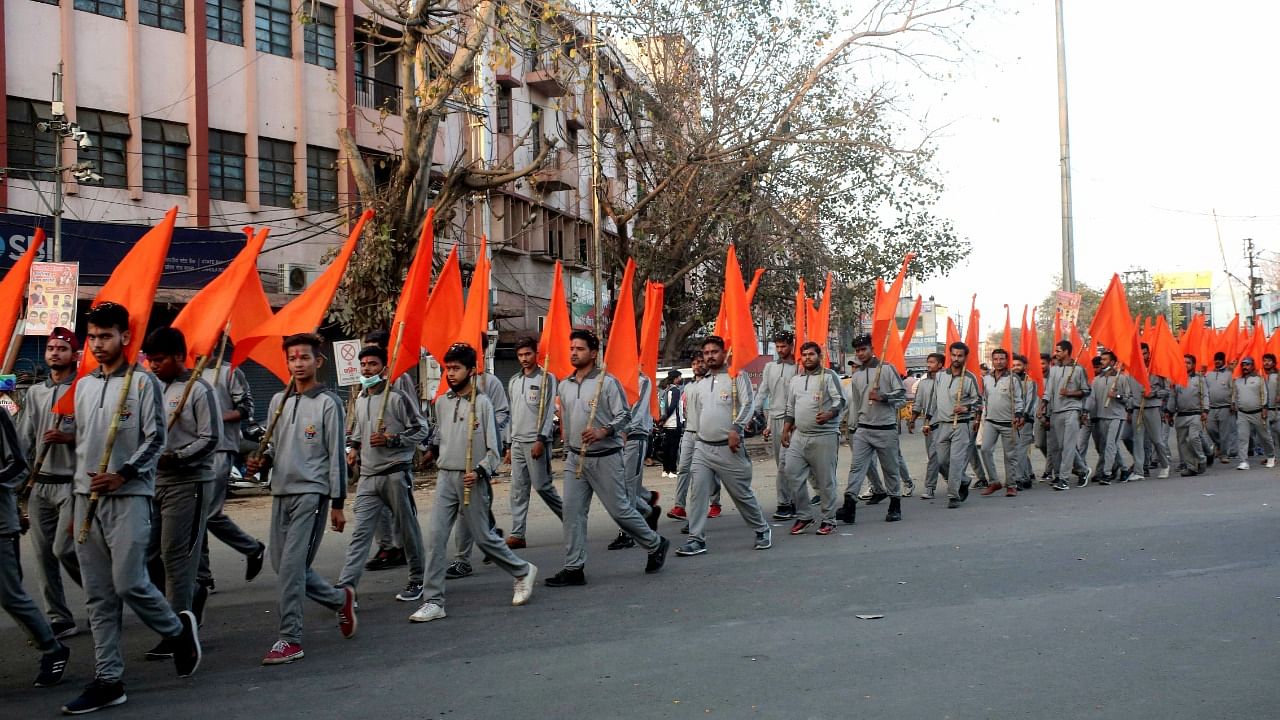
Building a particular narrative is an arduous task. For if it is neither foolproof nor unbiased, it falls. That is what India is witnessing: the collapse of the secular-liberal narrative, which has too many holes. But the narrative replacing it, the Hindu nationalism, suffers from the same folly too, which has once again been exposed by the decision of the South Delhi Municipal Corporation to close meat shops during this Navaratri.
Ignorance may be bliss for the common man, but it works as a trap in the political arena. The fault lines of the new narrative display utter ignorance about its core, the Hindu faith, which is more a confederation of beliefs, cultures, and rituals as diverse as Bharat itself. This element of ignorance stems from not having a proper understanding of the true nature of Hinduness.
Vinayak Damodar (Veer) Savarkar, the brave freedom fighter-turned-father of Hindutva ideology, was a Marathi Chitpavan Brahmin. K B Hedgewar, the founder of the Rashtriya Swayamsevak Sangh (RSS), too was a Marathi Deshastha Rigvedi Brahmin. The environment they were raised in shaped their ideas, and that environment was essentially Marathi Vaishnavite Hindu by character.
Savarkar was obsessed with the idea of political Hindutva (he was not a cow-worshipper), and his Hindu Mahasabha refused to be embroiled in controversies about food habits. But the RSS has always nurtured a fervour of religiosity and has imposed a limited, sectarian knowledge of the Hindu faith on the entire Sangh Parivar. That is why the Bharatiya Janata Party (BJP) refuses to chant 'Jai Ma Kali' in Bengal and harps only on 'Jai Sri Ram'.
The Vaishnavite mindset was clear about choosing Ayodhya (and now concentrating on Mathura) to rekindle the Hindu pride. Both Ram and Krishna are presented as reincarnations of Vishnu. Under the circumstances, it is not unusual that the Vaishnav culture of vegetarianism will be imposed by the Sangh Parivar and its political wing, the BJP. They are not even aware that it hurts the Shakta Hindus, who ritualistically eat meat on specific days of the Navaratri (particularly Durga Navaratri). Thus, they hurt their own cause: Instead of uniting the Hindus, they divide them by trying to stifle the minority denominations within the Hindu faith.
Such mistakes are rooted in the belief that what I see around me is universally true. On a personal level, I had fought the instruction from my son's Delhi school that only vegetarian food would be allowed from home. It was not politics but the local culture that drove the school authority to issue such notice. But when I explained to them that my Bengali food culture is different, they yielded.
The problem with the political class is that they do not yield. They try to impose their diktat on 'the others', as in this case of no meat during Navaratri, not only on Muslims or Christians but also on Shakta, Aghori, Naga sadhus and so on. They do not even know that these sects, particularly the Vaishnava and Shaivites, had violent confrontations on many such cultural or faith-related differences in the past.
What the Sangh is doing is undermining Adi Shankara (700-750 CE), who unified the five main denominations by combining worshipping of Vishnu/Narayan, Shiva, Devi Ma, Surya, and the devotees' ishta devata (like Ganesha, Kartikeya or any other deity worshipped daily by the household), thereby promoting the Smarta Panchayatana puja that gave birth to modern unified Hinduism.
There was no question of a unified food system in this framework introduced by Shankaracharya, for what he brought in was unity in diversity. Over time it extended to other dharmic religions (that believe in dharma, like Buddhism, Jainism, Sikhism), and later it turned into quintessential India.
The Hindu faith reconciles the opposites. Until today, we find a few Ravana temples, though Ravana was the archenemy of 'maryada purushottam' Ram. Significantly, while Devi Durga killed Mahishasura, there still exists a tribe called Asura, who worship Mahishasura, and they too are traditional Hindus. Moreover, even an atheist is allowed into the Hindu fold.
The true Hindu tradition is not about coercing others or imposing one's faith on others, but rather the opposite. The Rig Veda (which was composed, as indicated by the astronomical positions described by later texts, more than five thousand years ago) said, "Ekam sat, vipra bahudha vadanti" (Rig Veda 1.164.46). It means 'the absolute truth, or God, is one; but the wise men call Him by different names. True Hindus never forgot this teaching. That is why Ramkrishna Paramhansa (the guru of Swami Vivekananda) echoed it so many thousand years later: Jato mat tato path (as many faiths, so many ways).
So, if the RSS and BJP want to build a political culture based on dharma, which is at the core of the Hindu faith along with Karma and rebirth, they should concentrate on fighting adharma, i.e. something that damages or destroys the creation, inclusive of the individual, the collective, and the earth. Instead, if they concentrate on the imposition of sectarian rituals and food habits, it will be a great disservice to the Hindu faith itself.
(The writer is a journalist and author)
Disclaimer: The views expressed above are the authors' own. They do not necessarily reflect the views of DH
Watch the latest DH Videos here: